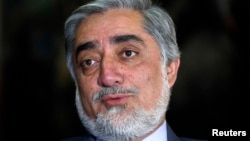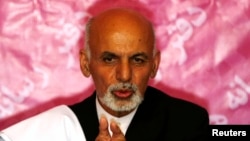ISLAMABAD —
Preliminary and partial official results from Afghanistan’s April 5 presidential election show a close contest between opposition politician Abdullah Abdullah and former finance minister Ashraf Ghani.
The Afghan Independent Election Commission has counted more than 500,000 votes of the seven million ballots cast. The early figures put Abdullah Abdullah in the lead with nearly 42 percent of the votes counted while his nearest rival, Ashraf Ghani, has about 38 percent.
Announcing the details at a news conference Sunday in Kabul, Commission Chairman Ahmad Yousuf Nuristani cautioned this is not the final result and the frontrunner could change. He said the initial results are from just 10 percent of the polling stations in 26 of Afghanistan’s 34 provinces.
Afghan officials also acknowledge that recorded incidents of serious fraud have exceeded figures for the 2009 presidential election when more than a million votes were canceled. Nuristani says his commission is determined to address the issue.
He said there is no doubt fraud has taken place in many parts and the Independent Election commission is firmly committed to resolve the issue within its authority and present only those results that are free of fraud.
Nuristani vowed to do so in a transparent and open manner in the presence of media, election observers and representatives of the candidates.
He emphasized the primary job of investigating irregularities and fraudulent votes lies with the country’s Independent Election Complaints Commission.
There could be a runoff election between Abdullah and Ghani if neither gains more than 50 percent of the vote when the final results are announced on May 14.
The initial results show a third candidate running with the support of President Hamid Karzai’s brothers - Zalmai Rassoul - trails far behind with nearly 10 percent of the votes counted.
Speaking to reporters, presidential candidate Ghani said the lead Abdullah has at this stage is not significant.
“We are in a hundred minute (football) game and we have only down with ten minutes," Ghani said. "So, as Chairman Nuristani said the results will change every day, every two days, three days.”
The international community is praising the high turnout of an estimated 60 percent of the 12 million eligible Afghan voters in the April 5 balloting, there are fears the evidence of widespread fraud could undermine the legitimacy of the election seen crucial for Afghanistan’s future stability.
The winning candidate will replace President Hamid Karzai who has been leading the country for more than 12 years and could not run again because of constitutional limits. The political transition will be the first democratic transfer of power in war-ravaged Afghanistan.
The United Nations welcomed Sunday’s announcement of the first batch of partial results as a further step towards completing the election process, while noting the figures represent only a small portion of the millions of ballots cast.
A statement from the U.N. Assistance Mission in Afghanistan cautioned that until the final results are announced by election authorities, “stakeholders should be careful in drawing premature conclusions so as not to create inaccurate expectations.”
The Afghan Independent Election Commission has counted more than 500,000 votes of the seven million ballots cast. The early figures put Abdullah Abdullah in the lead with nearly 42 percent of the votes counted while his nearest rival, Ashraf Ghani, has about 38 percent.
Announcing the details at a news conference Sunday in Kabul, Commission Chairman Ahmad Yousuf Nuristani cautioned this is not the final result and the frontrunner could change. He said the initial results are from just 10 percent of the polling stations in 26 of Afghanistan’s 34 provinces.
Afghan officials also acknowledge that recorded incidents of serious fraud have exceeded figures for the 2009 presidential election when more than a million votes were canceled. Nuristani says his commission is determined to address the issue.
He said there is no doubt fraud has taken place in many parts and the Independent Election commission is firmly committed to resolve the issue within its authority and present only those results that are free of fraud.
Nuristani vowed to do so in a transparent and open manner in the presence of media, election observers and representatives of the candidates.
He emphasized the primary job of investigating irregularities and fraudulent votes lies with the country’s Independent Election Complaints Commission.
There could be a runoff election between Abdullah and Ghani if neither gains more than 50 percent of the vote when the final results are announced on May 14.
The initial results show a third candidate running with the support of President Hamid Karzai’s brothers - Zalmai Rassoul - trails far behind with nearly 10 percent of the votes counted.
Speaking to reporters, presidential candidate Ghani said the lead Abdullah has at this stage is not significant.
“We are in a hundred minute (football) game and we have only down with ten minutes," Ghani said. "So, as Chairman Nuristani said the results will change every day, every two days, three days.”
The international community is praising the high turnout of an estimated 60 percent of the 12 million eligible Afghan voters in the April 5 balloting, there are fears the evidence of widespread fraud could undermine the legitimacy of the election seen crucial for Afghanistan’s future stability.
The winning candidate will replace President Hamid Karzai who has been leading the country for more than 12 years and could not run again because of constitutional limits. The political transition will be the first democratic transfer of power in war-ravaged Afghanistan.
The United Nations welcomed Sunday’s announcement of the first batch of partial results as a further step towards completing the election process, while noting the figures represent only a small portion of the millions of ballots cast.
A statement from the U.N. Assistance Mission in Afghanistan cautioned that until the final results are announced by election authorities, “stakeholders should be careful in drawing premature conclusions so as not to create inaccurate expectations.”





